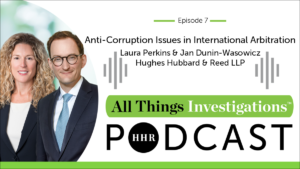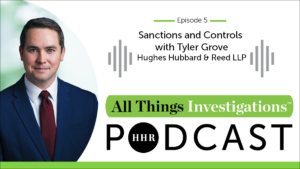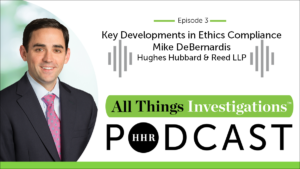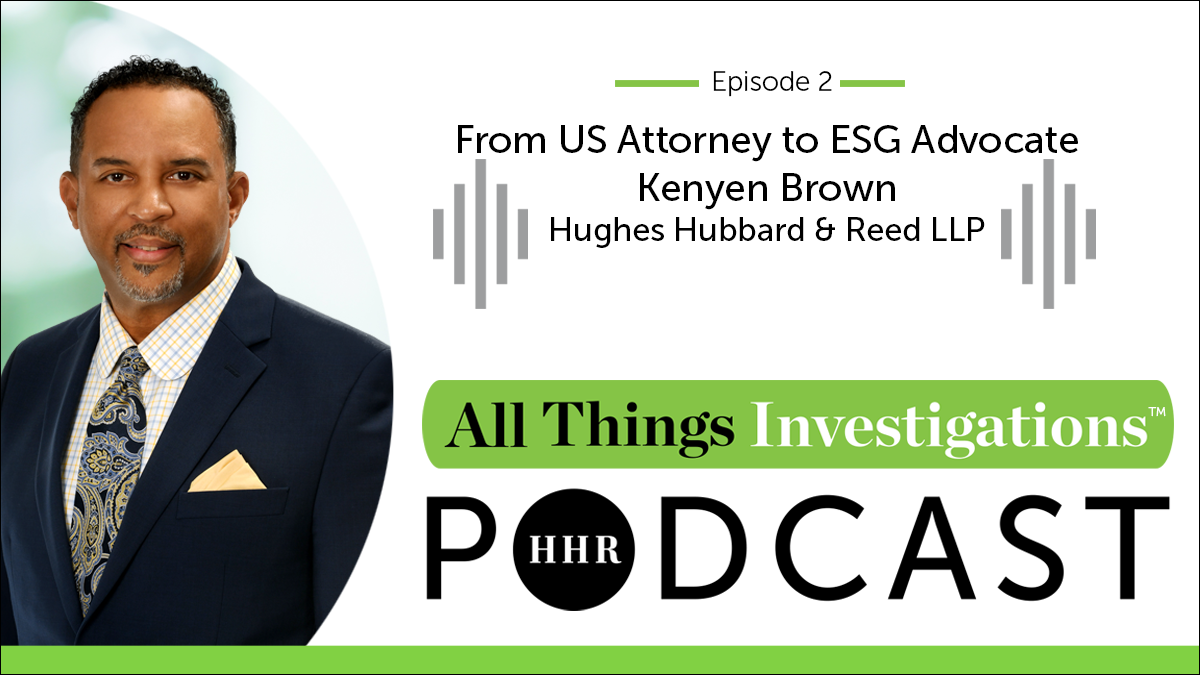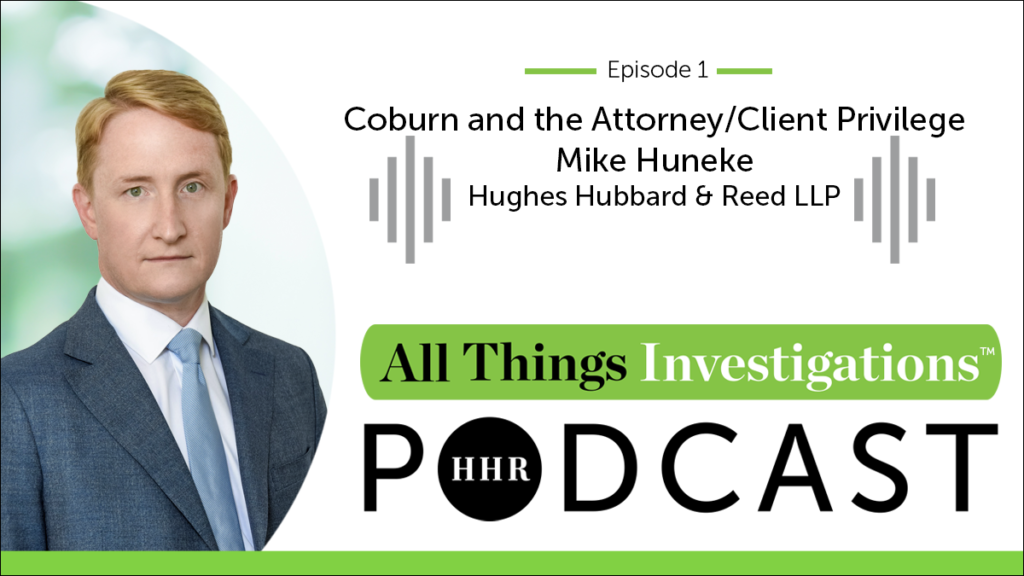The Compliance Podcast Network is thrilled to announce its latest podcast, All Things Investigations, a podcast from the law firm Hughes Hubbard & Reed LLP’s Anti-Corruption & Internal Investigations practice group. The group represents many of the premier companies around the world, providing advice on issues spanning the full anti-corruption and compliance spectrum. In this podcast host Tom Fox and members of the Hughes Hubbard Anti-Corruption & Internal Investigations practice group will highlight some of the key legal issues involved in white collar and other investigations, both domestically and internationally. We will tackle topical issues involved in investigations as well as explore how companies can help prevent and detect issues that arise in conducting business on a worldwide basis.
The inaugural episode features partner Mike Huneke, who has spent his career in both Washington, DC and Paris, France. For his entire 17-year career Huneke has been practicing in the anti-corruption space, on everything from investigations and government resolutions, acting as “buffer counsel” to companies subject to compliance monitors, third party and M&A due diligence, and proactive risk assessments and second-level compliance reviews. Most recently, Huneke and his colleagues were recognized for their role on the Airbus case by Global Investigations Review.
The subject of the podcast is the recent US District Court decision by Judge Kevin McNulty in the criminal case of US v. Coburn. McNulty is overseeing the criminal charges against former Cognizant Technology Solutions Corporation (Cognizant) executives Gordon J. Coburn and Steven Schwartz (Coburn; Schwartz or defendants) alleging violations of the Foreign Corrupt Practices Act (FCPA). Defendants had sought discovery from the Department of Justice (DOJ) consisting of materials turned over by counsel for Cognizant (outsourced investigation firm) to the DOJ in the company’s FCPA investigation. The defendants argued that Cognizant waived privilege over a broad category of documents when it disclosed a summary of its investigation findings to DOJ. The waiver, they argued, included “any communications regarding conduct alleged in the indictment and any materials related to Cognizant’s internal investigation.” Cognizant maintained that it did not waive the privilege over the entire internal investigation as the result of simply cooperating with DOJ or disclosing portions of investigative documents.
According to Huneke, Judge McNulty’s decision went back to “first principles. Why are we here? What are we doing? If you are sharing with the United States government privileged information, you have waived privilege by doing so.” That is not particularly controversial or new, but, as Huneke noted, “Judge McNulty then further granted a very broad waiver, a subject matter waiver of the privilege. Not only were interview memorandum from which external counsel read summaries to the government considered to have lost the protection of attorney-client privilege, but all documents supporting those memoranda, cited in those memoranda, drafts, notes or anything else based on which those memorandum were prepared were all ordered by Judge McNulty to be produced.”
It was this second step which Judge McNulty took that garnered much attention in the white-collar defense and FCPA defense bar. While Judge McNulty did not criticize making an oral presentation, he did say that if counsel makes an oral presentation to the DOJ, the underlying basis of that presentation is also not privileged and subject to discovery. Huneke noted, “it underscored there’s no kind of magic secret or magic protection that you get by doing something orally rather than in writing. I think there is a natural preference to maybe have an initial conversation orally with the government. This underscores the importance of reducing it to writing very soon afterwards. I assume that some of the thought behind giving an oral presentation and maybe not reducing it to a writing later is an idea that maybe you have some flexibility afterwards or there’s room to argue. If you are going to waive privilege anyway, it is probably a good practice to document what you think you said. Not only so that you and your client can anticipate what the potential waiver might be, but also to help you later, if you do have to make arguments against individuals who are pleading not guilty and fighting the prosecution about where the waiver line might have been drawn.”
Employees who are individually charged are really the “wild cards” in all of this. Huneke said, “they have nothing to lose at this point. Companies are ongoing concerns for them, the important thing is to resolve the matter and move on and get out.” It could involve the risk of debarment, and the potential impact on their stock price for example. Indicted individuals are often no longer employed. If they were executives there may be a legal or contractual right to advancement of their legal fees. They could well be facing jail time. Huneke concluded, “it is not surprising to see them really throwing the kitchen sink at it in furtherance of their defense. Moreover, they are none too pleased with the perceived infiltration of their legal team by the government or the way, probably in their view, the company turned on them.”
The bottom line is for investigative counsel, whether outsourced or in-house, to understand that their entire investigation, notes, memoranda, ideas and investigations may all be turned over to counsel for defendants if individuals are charged. Huneke emphasized that this ruling does not prevent outside or outsourced counsel from effectively investigating potential FCPA claims or negotiating with the government. If there is a settlement reached, it is “based on full information and everyone having the same information. We would rather the government have more, rather than less information, to make sure we are not accused later, of having not provided something to the DOJ that we should have. It does mean it will create additional burdens on the government to track what information it receives. If the government wishes to take a strict view of its disclosure obligations to then individual defendants, and there will be more documents it needs to carefully track and monitor and make sure it is complying with of those obligations.”
Huneke concluded, “if the DOJ is going to reinstitute the full force of the Yates Memo regarding its prosecution of individuals, it may well create additional cost and a longer tail to the consequence of these things. It could also require, going forward, defense counsel to take a very disciplined and well documented approach with the DOJ.” It certainly does not mean you cannot have informal discussions with the DOJ, but it does mean any document response must be “meticulously detailed, documented, cataloged, including the reasons for any redactions or things held back for privilege otherwise.”
You can check out the full podcast with Mike Huneke on All Things Investigations. To find out more about the Hughes Hubbard Anti-Corruption & Internal Investigations practice group click here. All Things Investigationswill post every other Monday on the Compliance Podcast Network.
